Finding home through the fog of gogo boys and disco balls
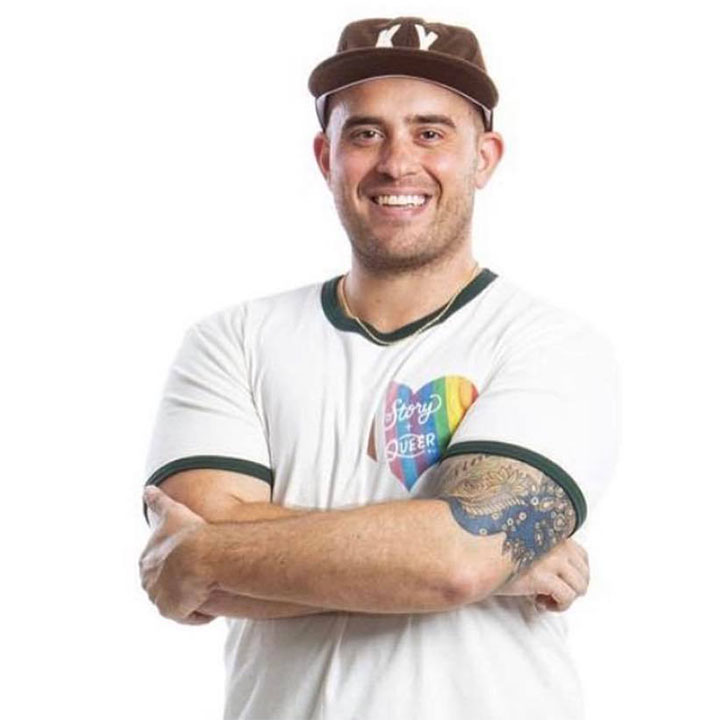
he/him
spencer@queerkentucky.com
It’s go-go boy night at the local bar and as I enter, I suddenly feel like an anxious little kid again. Swarms of men crowd the space and rub up against each other (and me) as they shimmy toward the bartenders. Shy and unnerved, I cling to my good friend, Paris, who came with me. I never leave home without an emotional support lesbian. As a 33-year-old man, I clearly can’t hide behind my mother’s legs like I did as a 6-year-old at family reunions. But a shot of Tito’s or Makers — that’s the next best thing.

By Miguel Angel Reyes Photography
I feel like I don’t relate with most of the gay men around me, glowing underneath the rainbow lights and disco ball. I want to, but I can’t help but feel like I don’t fit in. Some smile at me, I smile back. Most ask me how my LGBTQ+ advocacy work is going because my personal and professional identity are wrapped up into one. Some meet eyes with me, but we both quickly look away because of a one-off Grindr or Sniffies encounter. I order a stiff drink from the muscled bartender that I just know finds me annoying.
I watch the crowd dance, laugh, and grind while they shove dollars into the jockstrap of an oiled up circuit boy on stage. “I want to join the dance floor, but this invisible barrier of fear prevents me from doing so,” I think to myself. “I’ll see if Paris wants me to buy her another drink.”
An excuse to get myself another, obviously.
“Never forget to bring the lesbian security blanket,” I think to myself while half-convincingly cutting up with my pillow princess pal. After we giggle and the less-than-heartfelt smirk fades from my face, I silently begin gazing around the room, not sure what to do next.
I pull out my phone and start scrolling through Instagram and Twitter, acting like I’m too busy and too good for those around me. I order another double vodka soda. I cling to Paris in hopes she will take care of me when I black out. I promise her (and myself) that I’ve got a handle on the drinking situation. However, the drinks increase like I’m practicing my multiplication tables, and they slip down my throat faster and faster each round.

The anxiety from the fear of coming off as awkward, creepy and ugly in a place where I’m choosing to only pay attention to male perfection, is the same familiar anxiety of being put on the “skins” team in middle school sports: vulnerable to criticism and jokes from the cisgender male identity.
If you’re 30 or older, you may remember “shirts and skins” to distinguish sports teams growing up. I always begged the universe to make me a shirt because I was self-conscious of the gut that plopped over my tight briefs and the body hair that grew in a little too soon.
For me, taking my shirt off during a game of shirts and skins soccer or football is the same feeling as walking into a gay bar fully clothed. Unlike the field, bars have booze, party favors, and the occasional bathroom rendezvous to make me feel less and less vulnerable as the night moves forward.
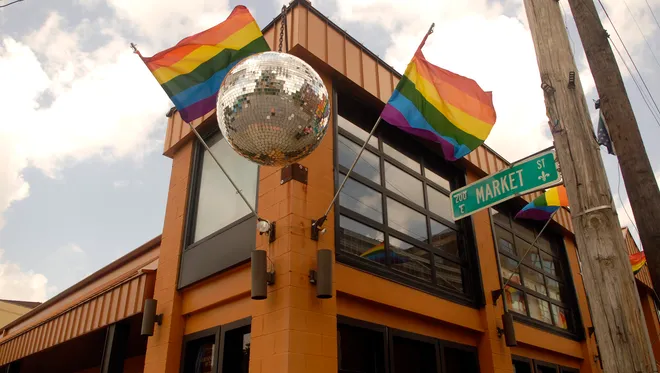
And, in some ways, I know I have it easier than more marginalized community members. At the end of the day, I’m still a white cisgendered man navigating mostly white-dominated spaces.
Yes, I can navigate most spaces without systemic discrimination, but fitting in with acceptance on the surface is one thing I have; feeling like I belong … that’s another story.
“I’ll find the smokers,” I think to myself. “The smokers are always inviting people. I’ll pretend I don’t have a lighter for my Newports and that’s how I’ll strike up a conversation.”
I grab another double vodka soda on the way to the patio from another muscled crop-top wearing bartender. He glares at me like he’s about to cut me off. See? I haven’t had too many drinks here yet. He doesn’t know about the shots I took at home to take the edge off.
I find a nearly blacked-out twink on the patio that I used to work with in my early 20s and I breathe a sigh of relief. I know we have much to catch up on — and suddenly, here’s my chance to connect with another gay man at the bar. That’s what we’re supposed to do, right? We catch up with what we’re doing currently and get nostalgic about years passed while chain-smoking. I look at Paris for reassurance. She looks worried.
…
And that’s the last thing I remember.
I woke up on Paris’ couch deep in the next day’s afternoon. Panic sets in. You know the feeling. My pants are wet, and I don’t know if it’s from the rain or if I had pissed myself. I blame it on the rain. Thankfully, I passed the phone-wallet-keys check. Lord knows, there have been many times I haven’t been so lucky.
I feel waves of anxiety. It’s not anxiety about fitting in with the “normal” and/or “cool gays” I had aspired to connect with the night before, but a different anxiety. It’s regret, shame, remorse, embarrassment, and on and on.
I breathe out a rueful “Fuuuuuck.” I’ve now given people legitimate reasons to not enjoy my company. I ask Paris not to tell me how sloppy I was. I’m a walking fulfilled prophecy — my insecurities were confirmed by my own drunken indiscretion.
The wildest thing about this is that I’m a repeat offender. Not only has this happened several times in 2022, but I started this chaos in my gayby days. The same pattern of anxiety mixed with booze made my early 20s a blur. I sobered up once from heroin.
Maybe a few times. Who’s counting?
I “didn’t have a problem with drinking though,” I assured everyone. Before I knew it, I found myself injecting dope again while drinking too. I was only 27. A DUI, the death of a friend, the loss of family trust and the increasing likelihood of my impending death led me to rehab, again.
I got clean and sober. Bravo, me.
Slowly, but surely, my greatest obsession kicked in. I was going to be normal. I was going to walk into the gay bars, drink casually with friends, and enjoy the life of a non-alcoholic drinker. “I’ve been sober long enough,” I’d tell myself. “I can totally drink in moderation and go back to my former stomping grounds and reconnect with the ‘scene.’” However, by the time I’m on my fourth or fifth double, I know I had failed with my objective of drinking socially. Eventually the bartender cuts me off, and that’s why I eventually stop for the evening.
Once I am cut off, I do what any good junkie does: get on Grindr and find the nearest parTy. Never in my life did I think I’d be blowing clouds with a man I’d never met going down on my very soft cock.
It doesn’t matter though I’ll do better next time I go out! I got this. Maybe the bar was too small with little to nothing to do other than drink, and that’s how I lost control. Next time I’ll go to the drag club. Surely I won’t black out there; there is so much entertainment! But guess what? I got cut off from the bartenders there, too.
I kept pushing it. I pushed myself into spaces and substance filled situations and cloudy sex dens that I knew were toxic. I forced myself to connect with men I knew I wouldn’t have more than surface-level relationships with. My impulse to fit in with scenes I knew from media like the original Queer as Folk, circuit gays on Instagram and drunken drag brunches everywhere overtook self-care.
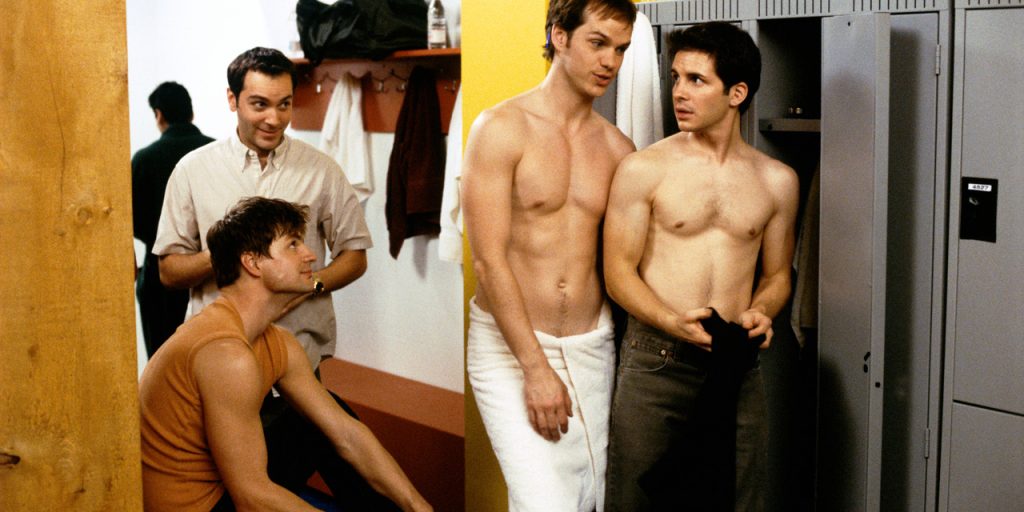
If I’m being hella honest with y’all, there isn’t one substance I can think of that I haven’t tried just to fit in and feel a sense of place. I’ve been with the drunks, the tweakers, the junkies and the stoners. None of it ever felt like home — just placeholders until I could force myself into the next clique.
How did I get here again? Why did I think I could safely stray from my sobriety? I am an addict and an alcoholic in every sense. Now, at 33, I am back to working on sobriety one day at a time. If there is one thing sobriety does — other than make you extra horny because your dick actually works — it creates a sense of clarity through reflection and healthy community involvement.
I’m lucky to have a sober community surrounding me with love and support. We read each other from time to time. But we’re a bunch of recovering drunks and junkies, so it’s all good Judy fun. This is where I fit in. What I’ve been looking for my entire life — Queer people that have the same problems I do and embrace their queerest of queer traits and flaws.
I think this is always where I’ve wanted to be but never accepted this for myself. We are Queers that don’t often subscribe to the status-quo of “normal gay scenes,” for lack of a better phrase. We’re the witches from The Craft. Napoleon and Pedro from Napoleon Dynamite. The X-Men or the Kids from Stranger Things. Like them, we have created spaces and communities so we can thrive where we are comfortable. I never want to forget that again.
Now, please don’t get me wrong. There’s nothing wrong with connecting with stereotypical gay spaces. People should exist where they connect and where they feel happy. Personally, I’ve learned that these spaces are rarely for me. And that’s alright.
I cannot speak for everyone who drinks and uses substances, but I know I cannot be an authentic person and build authentic relationships when I am under the influence. It just isn’t possible for me.
Data on the rates of substance abuse in gay and transgender populations are sparse. The Center for American Progress estimates that between 20 percent to 30 percent of gay and transgender people abuse substances, compared to about 9 percent of the general population.
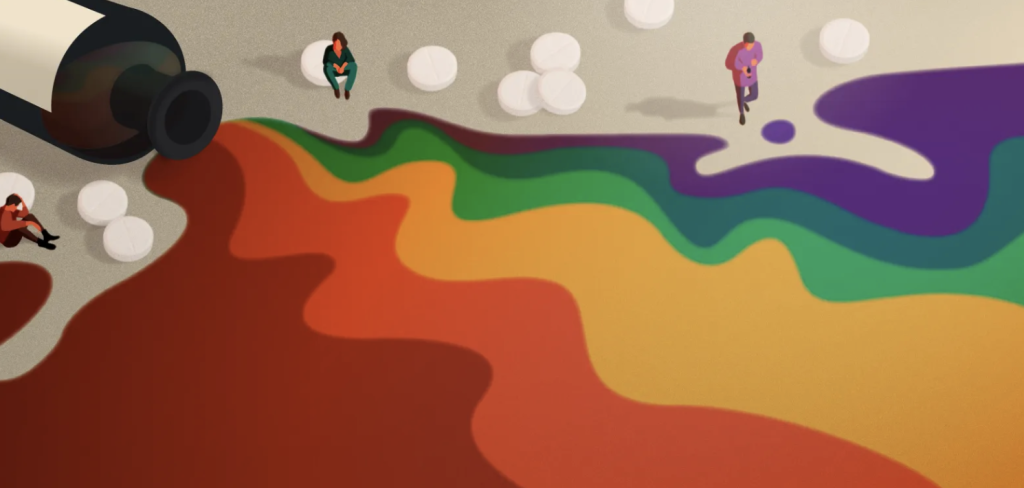
The Queer community has a substance abuse problem that not enough people are talking about. Either because we don’t like to paint our community in a bad light, or many of us partake in the parTy and are too ashamed (or out of it) to speak up. Normalizing and bringing visibility to this issue is crucial.
Visibility is life-saving. We are living in a post-Purdue Pharma OxyContin world. We are living in an alcohol- and meth-riddled community. These are BIG FACTS. They are ugly, but they are real. If we don’t start talking about this more, we will lose more lives. Some won’t die, but we will lose them to isolation in cloudy rooms where the time of day is rarely known and the creeping rot takes hold.
Today, I am choosing life. A life that suits me with the least amount of self-judgment.
One of my best Judys once told me, “I really enjoy Spencer more without a drink in his hand.” Maybe that should’ve been all the validation I needed. Maybe I didn’t need validation from a “cool gay” after all.
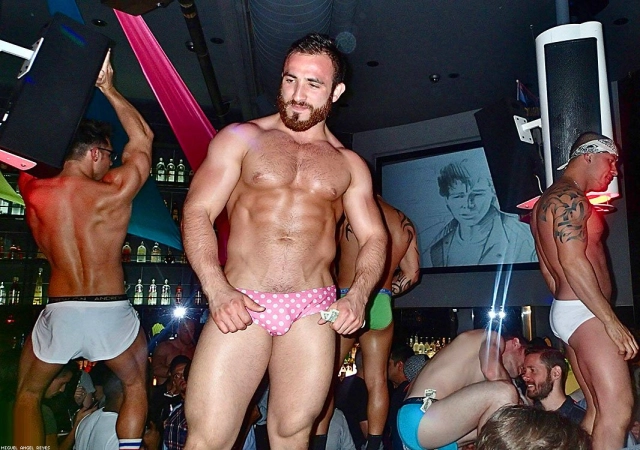



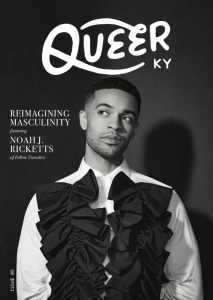






Leave a Reply
Want to join the discussion?Feel free to contribute!